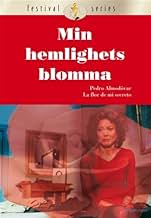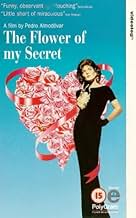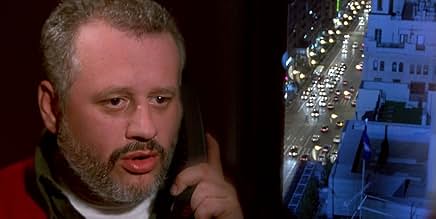NOTE IMDb
7,0/10
13 k
MA NOTE
Leo écrit des romans d'amour trash sous un pseudonyme mais, alors qu'elle se débat dans sa relation avec son mari, elle trouve que sa production devient plus sombre et réaliste.Leo écrit des romans d'amour trash sous un pseudonyme mais, alors qu'elle se débat dans sa relation avec son mari, elle trouve que sa production devient plus sombre et réaliste.Leo écrit des romans d'amour trash sous un pseudonyme mais, alors qu'elle se débat dans sa relation avec son mari, elle trouve que sa production devient plus sombre et réaliste.
- Récompenses
- 5 victoires et 13 nominations au total
Kiti Mánver
- Manuela
- (as Kiti Manver)
Histoire
Le saviez-vous
- AnecdotesDuring the film Leo talks about story lines for books. One of the stories is about a girl who kills her father after he tries to rape her and then along with her mother hides the body in a restaurant freezer. This is the basic plot of Volver (2006), one of Almodóvar's later films.
- Citations
Leo Macías: Except for drinking, everything's difficult for me.
- ConnexionsReferenced in Dolor y vida: Un acercamiento a 'La flor de mi secreto' (1995)
- Bandes originalesSoleá
Written by Gil Evans
Performed by Miles Davis
© BOPPER SPOCK SUNS MUSIC por Cortesía de SONY MUSIC
(p)1995 POLYGRAM IBERICA, S.A., por acuerdo con EL DESEO, S.A. - CIBY 2000
© 1995 EL DESEO, S.A., - CIBY 2000
Commentaire à la une
The title of Almodovar's later film, All About My Mother, was a nod of respect in the direction of the 1950 Hollywood film, All About Eve, which contains Bette Davis's famous line - "Fasten your seat belts, it's going to be a bumpy night". This quote could well appear at the start of most of the Spanish director's films, certainly Flower. Here, the rider on his emotional rollercoaster is Leocadia (Leo) Macias (Marisa Paredes), whose marriage and life are in crisis. She is not as young as she was, and her handsome husband Paco (Imanol Arias) has lost interest and is about to leave her. The "secret" of the title is that Leo writes romantic novels under an assumed name, but hers is not the only secret revealed in the movie.
Spoiled and self-centred Leo is not the most likeable of women; her sister Rosa (the wonderful Rossy de Palma) who looks after their aged mother probably deserves more of our sympathy. But the nicest people don't necessarily provide the most interesting stories; and Almodovar isn't trying to enlist our pity, but our understanding. If, according to the oft-quoted screenplay dictum, character is defined by action, then what he shows us is a courageous character who overcomes her self-pity, and takes up life and love again. Leo comes to terms with her loss, in much the same way as the mother in film's opening scene finally accepts that her son is dead. But that episode turns out to be a repeatable training session for doctors, so perhaps Almodovar is warning Leo that loss of love can take place more than once, or possibly he is suggesting to the audience that they regard Leo's story as a training session for life.
This unashamed melodrama is conveyed via magical acting, great camerawork, and above all intense colours. There are a few specifically Spanish touches, including a sequence where Leo and her mother return to their idyllic, picturesque family village, and a flamenco dance (to Miles Davis music). As usual, there are also reminders of the downsides of modern urban life, though some of the references to drugs and unemployment are a little forced and superfluous. All in all, this is a great pictorial story teller telling perhaps not his greatest tale, but certainly one worth listening to and seeing.
Spoiled and self-centred Leo is not the most likeable of women; her sister Rosa (the wonderful Rossy de Palma) who looks after their aged mother probably deserves more of our sympathy. But the nicest people don't necessarily provide the most interesting stories; and Almodovar isn't trying to enlist our pity, but our understanding. If, according to the oft-quoted screenplay dictum, character is defined by action, then what he shows us is a courageous character who overcomes her self-pity, and takes up life and love again. Leo comes to terms with her loss, in much the same way as the mother in film's opening scene finally accepts that her son is dead. But that episode turns out to be a repeatable training session for doctors, so perhaps Almodovar is warning Leo that loss of love can take place more than once, or possibly he is suggesting to the audience that they regard Leo's story as a training session for life.
This unashamed melodrama is conveyed via magical acting, great camerawork, and above all intense colours. There are a few specifically Spanish touches, including a sequence where Leo and her mother return to their idyllic, picturesque family village, and a flamenco dance (to Miles Davis music). As usual, there are also reminders of the downsides of modern urban life, though some of the references to drugs and unemployment are a little forced and superfluous. All in all, this is a great pictorial story teller telling perhaps not his greatest tale, but certainly one worth listening to and seeing.
Meilleurs choix
Connectez-vous pour évaluer et suivre la liste de favoris afin de recevoir des recommandations personnalisées
- How long is The Flower of My Secret?Alimenté par Alexa
Détails
Box-office
- Montant brut aux États-Unis et au Canada
- 1 104 622 $US
- Week-end de sortie aux États-Unis et au Canada
- 13 399 $US
- 13 août 2006
- Montant brut mondial
- 1 105 265 $US
- Durée1 heure 43 minutes
- Mixage
- Rapport de forme
- 1.85 : 1
Contribuer à cette page
Suggérer une modification ou ajouter du contenu manquant

Lacune principale
By what name was La fleur de mon secret (1995) officially released in India in English?
Répondre
![Regarder Tráiler [VO]](https://m.media-amazon.com/images/M/MV5BMjZlY2NjMDgtZDgyNC00NmZlLThmZGItODliMDBjMjNjNDZiXkEyXkFqcGdeQXRyYW5zY29kZS13b3JrZmxvdw@@._V1_QL75_UX500_CR0)































